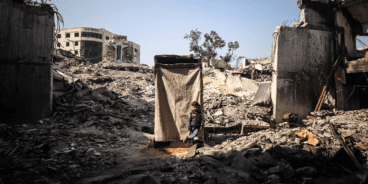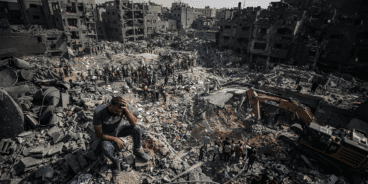
No-fly zone Will Help Stop Gaddafi’s Carnage
This article written by Prof. the Hon. Gareth Evans was originally published in Project Syndicate.
State sovereignty is not a licence to kill. No state can abdicate the responsibility to protect its people from crimes against humanity, let alone justify perpetrating such crimes itself. When it manifestly fails in that protection, it is the responsibility of the international community to provide it, if necessary – should peaceful means be inadequate – by taking timely and decisive collective action through the United Nations Security Council.
This is the “responsibility to protect” principle embraced unanimously by the General Assembly in 2005. There is no clearer case for its application than the dire situation unfolding in Libya. Muammer Gaddafi’s forces, on the ground and from the sky, have already massacred perhaps more than a thousand of his own people, protesting (initially peacefully) against the excesses of his regime. A bigger bloodbath seems inescapable if he does not step down. The need for timely and decisive action is overwhelming.
The Security Council, after moving with painful caution the first few days of the crisis, has over the weekend invoked the responsibility to protect principle and – in a historic first – agreed on a substantial package of measures to implement it: an arms embargo, asset freeze, travel bans and, importantly, reference of the situation to the International Criminal Court.
These measures are necessary and important, but they fall short of the threat or use of military force. Will they be enough to stop the killing? Or is it instead time to apply and enforce a no-fly zone, or to go further still and send in ground forces? This is a horribly difficult call, and not even the most passionate advocate of the responsibility to protect can pretend otherwise.
Declaring a no-fly zone is not the soft option it may seem: it must mean being prepared to shoot down jets and helicopter gunships that breach it, and that will mean a huge risk of hostage-taking or reprisal against any intervener’s nationals still in the country. Any invasion force, assuming one could be mustered at short notice, would raise the stakes much higher still.
The importance of the UN’s embrace of the responsibility to protect is that it ended a decade of division over gut-wrenching mass atrocities in the 1990s, when the global north often supported humanitarian intervention, while the south cited immunity from interference in internal affairs.
Consensus was negligible, and the result was UN-authorised action that was too often erratic, incomplete or counter-productive – as in the debacle of Somalia in 1993, the catastrophe of the Rwandan genocide in 1994, and the almost unbelievable default in Srebrenica in 1995 – or unlawful because it was not UN-authorised as in Kosovo in 1999.
The new principle sought common ground by recasting the issue in terms of responsibility, rather than rights, and protection, rather than intervention, and making clear that coercive military intervention was not the only option, but a last resort.
And it found it. The global response to the unfolding horrors in Kenya in 2008 was in spectacular contrast to the indifference greeting the butchery in Rwanda. International condemnation of Mr Gaddafi’s atrocities has been swift and universal. No-one now talks about sovereignty conferring immunity. But now this must be translated into action.
The second great hope of advocates of responsibility to protect was that consensus in principle would make agreement much easier on what to do in practice. But that has proved harder, as experience in Darfur, the Democratic Republic of Congo, Sri Lanka and elsewhere has unhappily demonstrated. But the lesson of these difficulties is not that the principle is irrelevant but that we have to do better in applying it in the future – and that future, with Libya, is now.
Sanctions, embargoes and the diplomatic isolation of Mr Gaddafi are the inescapable minimum of what is now required. But if they do not bite immediately, and the carnage continues, there will be no option but to do more. Military options should always be a last resort, but they cannot be excluded in extreme cases. Libya is as extreme as it gets.
It will be desperately difficult to get agreement on foreign boots on the ground, quickly or at all. But a strongly enforced no-fly zone is a realistic option, easier to contemplate as the last vulnerable expatriates leave the country and likely to be just as effective in forcing Mr Gaddafi’s capitulation. Planning for it should start immediately. For all that it has done so far, the ball remains in the Security Council’s court; not only the credibility of the responsibility to protect principle is at stake, but its own.
Related Content


Atrocity Alert No. 440: Israel and the Occupied Palestinian Territory, Protection of Civilians and Libya
